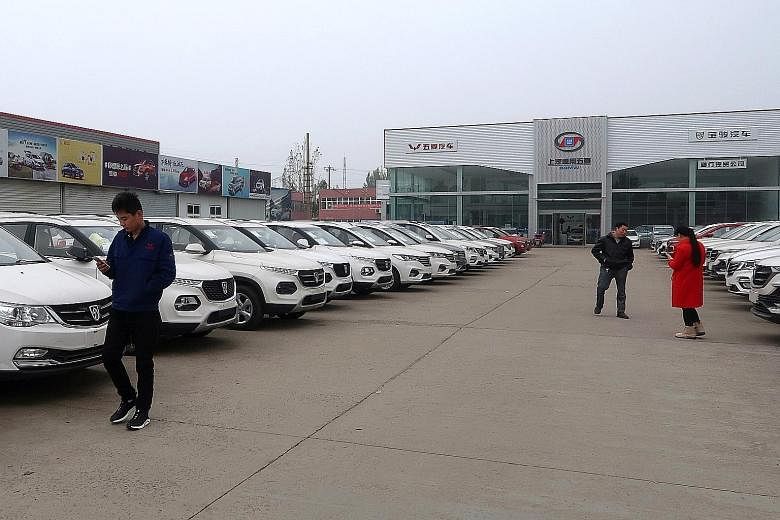BEIJING • Car sales in China plunged for a sixth consecutive month, intensifying pressure on global carmakers that have staked their future growth on the world's largest car market.
Retail sales of sedans, multipurpose vehicles and sport utility vehicles plummeted 18 per cent to 2.05 million units last month, the China Passenger Car Association said on Monday. That brought the drop in the first 11 months of the year to 4.3 per cent, all but ensuring the market will have its first annual decline in at least two decades.
With the trade war with the United States showing no signs of abating and slumping stocks weighing on purchasing power, the market that global carmakers have relied on for growth since the 1990s now risks an extended decline. Demand is also sputtering in Europe and North America, leaving car brands few places to go for growth.
Carmakers - which poured in billions of dollars in the past 20 years to bulk up factories in China - now need to view future expansion plans in a different light.
The US-China trade war has already prompted luxury-car makers BMW and Daimler to warn about lower profits, while Chinese consumers staying away from showrooms forced Jaguar Land Rover to shut a factory temporarily.
Carmakers' hopes of a trade war truce were boosted last week after President Donald Trump's tweet claiming that China had agreed to "reduce and remove" tariffs on American-made vehicles. Still, China did not confirm this and Mr Trump's advisers were left scrambling on how to explain the tweet.
Beyond a slowing economy, the rising popularity of car-sharing and ride-hailing services is reducing the need for individuals to buy cars.
Shared cars used by popular ride services such as Didi Chuxing will account for 30 per cent of China's passenger vehicles and a majority of auto mileage by 2025, according to a forecast by Mr Bill Russo, founder and chief executive of Shanghai-based consultancy Automobility. They currently account for 13 per cent of passenger vehicles.
The slowdown has pushed China's car inventory levels to a record high. An index tracking the volume of unsold cars reached its highest ever reading last month, based on data from the China Automobile Dealers Association.
China is also escalating its crackdown on peer-to-peer lending, a move that could hardly have come at a worse time for carmakers and dealers. Peer-to-peer lending dropped 20 per cent in the first half of this year and may shrink even further as policymakers push small and medium-sized operators to close, according to data compiled by 01Caijing and AskCI Corp.
The challenges are emerging just as global brands are making a bigger push into China, helped by the government opening up the economy.
BMW in October revealed a US$4.1 billion (S$5.6 billion) deal to secure control of its Chinese joint venture, becoming the first carmaker to take advantage of China's policy to let foreign companies own a majority holding of their local partnerships.
Daimler is interested in making a similar move, people familiar with the matter said last week.
Western brands are also boosting manufacturing capacity in China and expanding local production of models including electric cars. Tesla is pushing ahead with plans to set up production in Shanghai.
In the longer term, carmakers are betting that growth will return as China's middle class expands and new electric models lure consumers back to showrooms.
Volkswagen, the top foreign car brand in China, expects the market to be unchanged next year before returning to growth in 2020, its China chief Jochem Heizmann said last month.
BLOOMBERG

